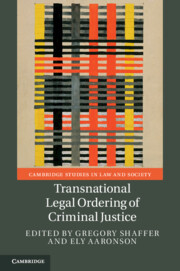Description
Transnational Legal Ordering of Criminal Justice
Cambridge Studies in Law and Society Series
Coordinators: Shaffer Gregory, Aaronson Ely
A new approach for studying the interaction between international and domestic processes of criminal law-making in today's globalized world.
Language: English
Subject for Transnational Legal Ordering of Criminal Justice:
Transnational Legal Ordering of Criminal Justice
Publication date: 11-2021
409 p. · 15.2x22.8 cm · Paperback
Publication date: 11-2021
409 p. · 15.2x22.8 cm · Paperback
Transnational Legal Ordering of Criminal Justice
Publication date: 07-2020
288 p. · 15.7x23.5 cm · Hardback
Publication date: 07-2020
288 p. · 15.7x23.5 cm · Hardback
Description
/li>Contents
/li>Biography
/li>
Hard and soft law developed by international and regional organizations, transgovernmental networks, and international courts increasingly shape rules, procedures, and practices governing criminalization, policing, prosecution, and punishment. This dynamic calls into question traditional approaches that study criminal justice from a predominantly national perspective, or that dichotomize the study of international from national criminal law. Building on socio-legal theories of transnational legal ordering, this book develops a new approach for studying the interaction between international and domestic criminal law and practice. Distinguished scholars from different disciplines apply this approach in ten case studies of transnational legal ordering that address transnational crimes such as money laundering, corruption, and human trafficking, international crimes such as mass atrocities, and human rights abuses in law enforcement. The book provides a comprehensive treatment of the changing transnational nature of criminal justice policymaking and practice in today's globalized world.
Part I. Introduction: 1. The transnational legal ordering of criminal justice Ely Aaronson and Gregory Shaffer; Part II. Transnational Legal Ordering and Transnational Crimes: 2. Why do transnational legal orders persist? The curious case of anti-money laundering Terence Halliday, Michael Levi and Peter Reuter; 3. Transnational criminal law or the transnational legal ordering of corruption? Theorizing Australian foreign bribery reforms Radha Ivory; 4. Transnational criminal law in a globalized world: the case of trafficking Prabha Kotiswaran; 5. The criminalization of migration: a regional transnational legal order or the rise of a meta-TLO? Vanessa Barker; 6. The strange career of the transnational legal order of cannabis prohibition Ely Aaronson; Part III. Transnational Legal Ordering and International Crimes: 7. The anti-impunity transnational legal order for human rights – formation, institutionalization, consequences, and the case of Darfur Joachim J. Savelsberg; 8. Colombian transitional justice and the political economy of the anti-impunity transnational legal order Manuel Iturralde; Part IV. Transnational Legal Ordering and Human Rights Standards in Criminal Justice: 9. International prison standards and transnational criminal justice Dirk van Zyl Smit; 10. The transnational legal ordering of the death penalty Stefanie Neumeier and Wayne Sandholtz; 11. Performance, power, and transnational legal ordering: addressing sexual violence as a human rights concern Ioana Sendroiu and Ron Levi; Part V. Conclusion: 12. Conclusions: a processual approach to transnational legal orders Sally Engle Merry.
Gregory Shaffer is Chancellor's Professor at the University of California, Irvine. His publications include seven books and over one hundred articles and book chapters, including Constitution-Making and Transnational Legal Order (with Ginsburg and Halliday, 2019); Transnational Legal Orders (with Halliday, 2015); and Transnational Legal Ordering and State Change (2013).
Ely Aaronson is an Associate Professor at the University of Haifa, Faculty of Law. His main areas of scholarship include legal history, socio-legal theory, criminal justice, and comparative and transnational legal theory. He is the author of From Slave Abuse to Hate Crime: The Criminalization of Racial Violence in American History (2014).
Ely Aaronson is an Associate Professor at the University of Haifa, Faculty of Law. His main areas of scholarship include legal history, socio-legal theory, criminal justice, and comparative and transnational legal theory. He is the author of From Slave Abuse to Hate Crime: The Criminalization of Racial Violence in American History (2014).
© 2024 LAVOISIER S.A.S.




